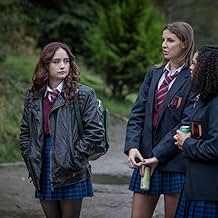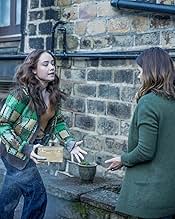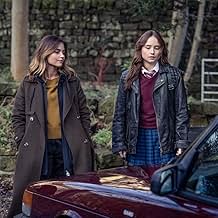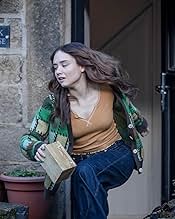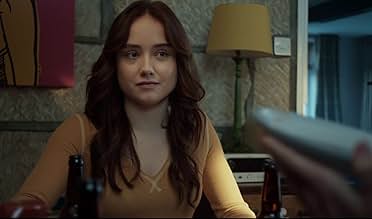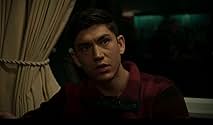Segue il detective Ember Manning deve capire come un incendio in una casa di villeggiatura sia collegato a un giornalista podcast che indaga su un caso irrisolto di persona scomparsa e a un ... Leggi tuttoSegue il detective Ember Manning deve capire come un incendio in una casa di villeggiatura sia collegato a un giornalista podcast che indaga su un caso irrisolto di persona scomparsa e a un triangolo amoroso illecito.Segue il detective Ember Manning deve capire come un incendio in una casa di villeggiatura sia collegato a un giornalista podcast che indaga su un caso irrisolto di persona scomparsa e a un triangolo amoroso illecito.
Sfoglia gli episodi
Trama
Recensione in evidenza
I don't know why I keep trying again with BBC drama. Whoever commissions all this stuff is going to go down in history alongside an infamous litany of heroic would-be worthiness and artistic worthlessness, albeit that I can't myself discern what is intended to be worthy about it. Certainly not its dramatic value.
This one is just grim, and the guilty include the sound technicians as well as the usual suspects of producers, writers, editors and the rest.
I don't know about the non-linear timeline thing in this one. OK I was fooled by it. Maybe I should take the optimistic view that it was a fresh use of the device that was cleverer than I was expecting, and I should rejoice in the effect. But I'm not left feeling optimistic.
I'm definitely not well-disposed towards yet another bloody cop-centred thing - where the lead cop is flawed, conflicted, emotionally involved, gets suspended halfway through, throws their weight about brainlessly etc, even though we contrive today's version of the plot twist - unless by chance some truly excellent drama results. Not this time I fear.
One little problem was that the focus character just wasn't a convincing policeperson. I doubt if this is Ms Coleman's fault, but perhaps someone else could have used the same material more convincingly: the things she does just aren't cop-like at all. One might take the view that this is because she's a fresh take, away from the old cliches: OK I'm open to that in principle, but this just didn't work for me.
One bit I did like was the big put-down when she tells the the Southern incomer victim of arson that she won't investigate his crime because it's a hopeless case, and she can't be bothered anyway because he's an entitled twirp. Now that's a real glimpse at the sort of policing I'm familiar with.
I'm certain there is mileage in a well-conceived and well-executed plot that exposes the bad young rebel girl versus exploited vulnerable child dimensions, and occasionally this one had a go and approached the mark, but never quite hit it. Why do girls behave like that? Asks one character, and is answered by the one who might know, sadly mumbling the lines, probably because they were so clunky even if true. There is insight to be imparted on this, to be sure, but scarce did we glimpse it, I fear. And the girl spotlighted in this work is not the unloved abandoned child of chaotic upbringing spattered with adverse childhood events, but the sort of poor little rich girl who tends to get featured so repeatedly in BBC scripts: who knows why!
OK let me be fairer. There are a few different women's stories here, from working-class to toff, schoolgirl to geriatric, single mum to housewife to academic, and even one ethnic. None of them seems to have much fun.
As for the abusers. I don't know. They were more a collective pastiche than individual characters. Maybe that's the right approach for a victim-centred view. The supposed serial child abuser at the centre of everything has somehow disappeared. Who and where is he? Do we already know him? The answer is perhaps intended to be the most interesting aspect of the whole story, but how the whole case could have gone cold is anyone's guess. And, clunk of clunks, when we finally find the witness who could perhaps cast light on the case she just happens to be delivering a lecture about Artemisia Gentileschi's "Judith Beheading Holofernes." I do think, dear production team that, if you want to weave in these kind of referential touches, you do need to be a master craftsman. Else, just keep it to the contemporary industrial TV that it is.
And that just about sums the thing up. It's not so much a fine blend of herbes de Provence as a pot pourri of half-formed styles, threads, and techniques that doesn't result in a great tasting compote. Loved the setting: great country, lovely vernacular stonework inside and out, fine with the principles: bad stuff and humdrum lurking beneath the idyll, female-centred lens - hence the comparisons with Happy Valley - but overall it's still a messy miss I fear, the plot twists and sub-plots might even be original but are not that absorbing, and the drama ultimately just isn't very dramatic, leading to a weak and unconvincing denouement. At least the top and tail flames seemed real, so some credit to the BBC's budget.
This one is just grim, and the guilty include the sound technicians as well as the usual suspects of producers, writers, editors and the rest.
I don't know about the non-linear timeline thing in this one. OK I was fooled by it. Maybe I should take the optimistic view that it was a fresh use of the device that was cleverer than I was expecting, and I should rejoice in the effect. But I'm not left feeling optimistic.
I'm definitely not well-disposed towards yet another bloody cop-centred thing - where the lead cop is flawed, conflicted, emotionally involved, gets suspended halfway through, throws their weight about brainlessly etc, even though we contrive today's version of the plot twist - unless by chance some truly excellent drama results. Not this time I fear.
One little problem was that the focus character just wasn't a convincing policeperson. I doubt if this is Ms Coleman's fault, but perhaps someone else could have used the same material more convincingly: the things she does just aren't cop-like at all. One might take the view that this is because she's a fresh take, away from the old cliches: OK I'm open to that in principle, but this just didn't work for me.
One bit I did like was the big put-down when she tells the the Southern incomer victim of arson that she won't investigate his crime because it's a hopeless case, and she can't be bothered anyway because he's an entitled twirp. Now that's a real glimpse at the sort of policing I'm familiar with.
I'm certain there is mileage in a well-conceived and well-executed plot that exposes the bad young rebel girl versus exploited vulnerable child dimensions, and occasionally this one had a go and approached the mark, but never quite hit it. Why do girls behave like that? Asks one character, and is answered by the one who might know, sadly mumbling the lines, probably because they were so clunky even if true. There is insight to be imparted on this, to be sure, but scarce did we glimpse it, I fear. And the girl spotlighted in this work is not the unloved abandoned child of chaotic upbringing spattered with adverse childhood events, but the sort of poor little rich girl who tends to get featured so repeatedly in BBC scripts: who knows why!
OK let me be fairer. There are a few different women's stories here, from working-class to toff, schoolgirl to geriatric, single mum to housewife to academic, and even one ethnic. None of them seems to have much fun.
As for the abusers. I don't know. They were more a collective pastiche than individual characters. Maybe that's the right approach for a victim-centred view. The supposed serial child abuser at the centre of everything has somehow disappeared. Who and where is he? Do we already know him? The answer is perhaps intended to be the most interesting aspect of the whole story, but how the whole case could have gone cold is anyone's guess. And, clunk of clunks, when we finally find the witness who could perhaps cast light on the case she just happens to be delivering a lecture about Artemisia Gentileschi's "Judith Beheading Holofernes." I do think, dear production team that, if you want to weave in these kind of referential touches, you do need to be a master craftsman. Else, just keep it to the contemporary industrial TV that it is.
And that just about sums the thing up. It's not so much a fine blend of herbes de Provence as a pot pourri of half-formed styles, threads, and techniques that doesn't result in a great tasting compote. Loved the setting: great country, lovely vernacular stonework inside and out, fine with the principles: bad stuff and humdrum lurking beneath the idyll, female-centred lens - hence the comparisons with Happy Valley - but overall it's still a messy miss I fear, the plot twists and sub-plots might even be original but are not that absorbing, and the drama ultimately just isn't very dramatic, leading to a weak and unconvincing denouement. At least the top and tail flames seemed real, so some credit to the BBC's budget.
I più visti
Accedi per valutare e creare un elenco di titoli salvati per ottenere consigli personalizzati
Dettagli
- Data di uscita
- Paese di origine
- Lingua
- Celebre anche come
- Пристань
- Luoghi delle riprese
- Lancashire, Inghilterra, Regno Unito(Hollingworth Lake, Littleborough)
- Aziende produttrici
- Vedi altri crediti dell’azienda su IMDbPro
- Tempo di esecuzione4 ore
- Colore
- Mix di suoni
- Proporzioni
- 16:9 widescreen
Contribuisci a questa pagina
Suggerisci una modifica o aggiungi i contenuti mancanti




